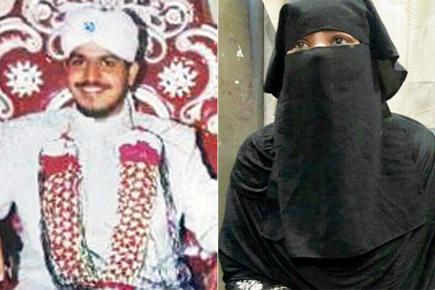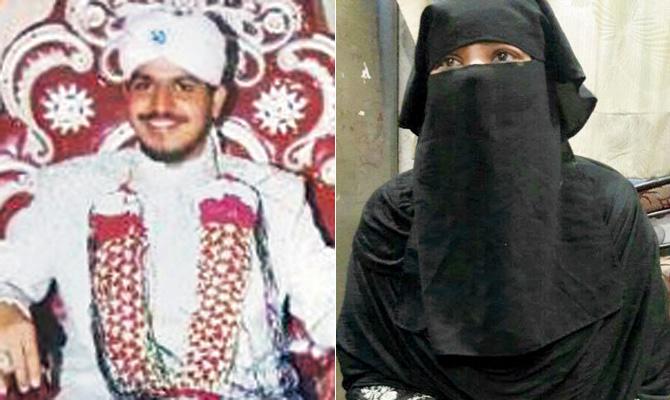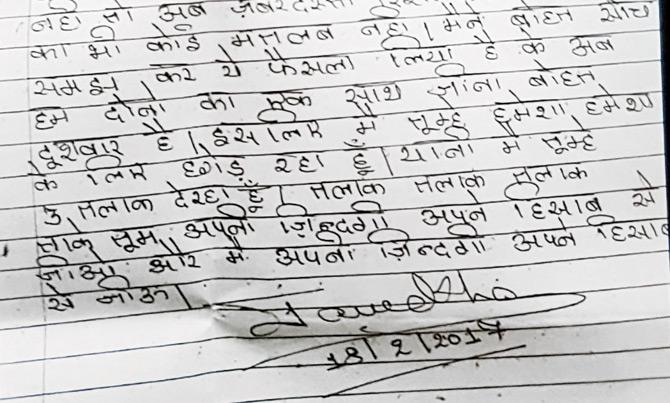As Muslim divorce debate rages on, Mira Road resident thrashes wife and throws a chit at her mother's home to claim they are divorced, defying police and clerics


Javed Khan and his wife
ADVERTISEMENT
Three words, presumably scribbled on a sheet of paper, have shattered Rukshana's (name changed) world. Amidst a high-pitched debate on the controversial practice of triple talaq in Muslim Personal Law, the 29-year-old's husband has allegedly divorced her via a note flung at her. While two aalims (Muslim scholars) say the divorce is not valid, a mufti's (a Muslim legal expert empowered to give rulings on religious matters) fatwa states otherwise.
Also read: Woman claims spouse sent 'triple talaq' for not giving dowry
Khan, a resident of Mira Road, and Rukshana married in October 2009. Within days of the nuptials, Rukshana's mother-in-law allegedly began beating her up every day. Despite interventions from relatives over the years, she found no respite.

The sheet of paper
Had enough of it
In August last year - after a particularly nasty thrashing - Ruskhana questioned Khan's silence over the alleged abuse. She resolved to approach the police or an NGO by herself if he chose to stay quiet. Moved, Khan then accompanied her to the police station, where she showed the wounds she allegedly sustained at the hands of her mother-in-law. The police directed the couple to first go for a medical test, which Khan resisted. He implored the police to talk to his mother, instead. The police refused to do so and filed a non-cognisable offence in the matter.
Khan thereafter dropped Rukshana at her mother's house in Govandi, assuring her that he would return for her soon. But, he allegedly kept coming up with excuses to take her back to his house over months. Rukshana's brother tried to broker peace in the interim, but the meeting turned into a shouting match between him and Khan.
The talaq
On February 18 this year, Khan paid a visit to Rukshana, during which he allegedly hit her, told her that he wanted nothing more to do with her, and threw a chit at her. The family then rushed to the aid of a bleeding Rukshana, and no one noticed the sheet of paper.
"The next day, he called us up and asked if we had seen the chit. I asked him what he was referring to, but he said he had written all that he wanted to say. I told him I hadn't found any chit and asked him to come over for a talk," said Rukshana's father. "We figured he had written talaq talaq talaq on the chit. We couldn't find the sheet of paper as the house had been left in a disarray during the fight. He sent us a photo of the chit."
Also read: Talaq code of conduct coming soon, says Muslim Law Board
The family immediately consulted two aalim (Muslim scholars trained in Islam and Islamic law), who told them a divorce cannot be granted this way. "They said both were still married to each other," said the father.
After Khan learnt of the consultation with the aalim, he stayed at Rukshana's house for dinner and returned to his home, saying his mother was ill. Rukshana wanted to accompany him back to her marital home, but Khan assured her that he would return the next day to pick her up. Over the next five days, he allegedly kept coming up with excuses against taking her home.
Valid, says mufti
Exasperated, Rukshana planned to return on her own. On learning of this, Khan called her up to argue that his talaq via paper was valid. He claimed that he had consulted a mufti (Muslim legal expert empowered to give rulings on religious matters), Ashraf Raza Qadri, affiliated with Mufti Qazi Idarah Sharia Maharashtra based in Nagpada, who had issued a fatwa (a ruling on a point of Islamic law given by a recognised authority) that the talaq was valid. In his fatwa the mufti called the triple talaq haraam and a gunah (sin), but claimed that it was nevertheless valid.
Rukshana's family visited the mufti, who reiterated the validity of the divorce. "When he told him that we had retrieved the chit, he said regardless of whether we received it, the husband had passed it on and, therefore, the talaq was valid. We have been told by another mufti to get a fatwa from Dargah-e-Ala Hazrat (the most revered shrine for followers of the Barelvi Sunni sect) from Bareilly to resolve this," said Rukshana's father.
Also read: It's over! Man divorces Hyderabad-based wife through newspaper ad
Her mother sought a reconciliation, instead of jumping to a talaq. "Around 3,000 people had come for the nikah and today, he is divorcing her in this way. If there is a problem, we can sit and talk about it," she said.
The father said he is in talks with a lawyer to file a petition in court against the talaq.
Not so, say lawyers
Noted family court lawyer Kranti Sathe pointed out that since Rukshana didn't receive the chit in hand, "she is still the wife legally and can go stay with him". "Triple talaq is unconstitutional and sub judice before the Supreme Court."
Renowned lawyer Mrunalini Deshmukh clarified that it wasn't a valid divorce. "An order by the Bombay High Court on Sharia law states that the divorce process should be held over a three-month period. The husband has to first give a notice to the wife, either by himself or through a lawyer. As for the mufti claiming that the talaq is valid, muftis have distorted the law. Throwing a chit or sending a message through WhatsApp in the not the way to get a divorce."
Family court lawyer Anagha Nimbkar echoed the unconstitutionality of the practice. "The practice to granting talaq through SMS/email/letter should be banned."
Zakia Soman, Mumbai-based co-founder of Bharatiya Muslim Mahila Andolan (BMMA), said the chit is among some of the horrible and ad-hoc ways in which triple talaq is being misused."
Also read - Triple talaq is cruel: Allahabad High Court
She said the BMMA is against triple talaq per se because "nobody should have the unilateral right to divorce". "There should be mutual discussions and the couple must be given a chance for reconciliation. All this should happen over a period of time."
Either way, she points out, the woman is entitled to maintenance, support and a home.
Despite several attempts, Khan was not available for comment.
With inputs from Hemal Ashar
 Subscribe today by clicking the link and stay updated with the latest news!" Click here!
Subscribe today by clicking the link and stay updated with the latest news!" Click here!






